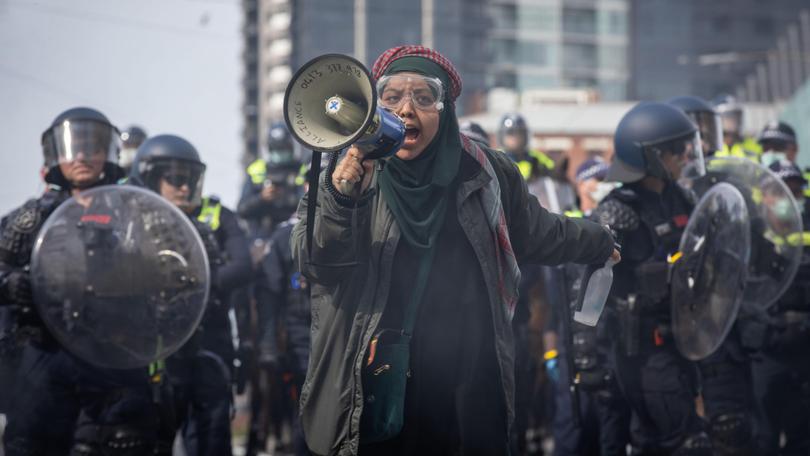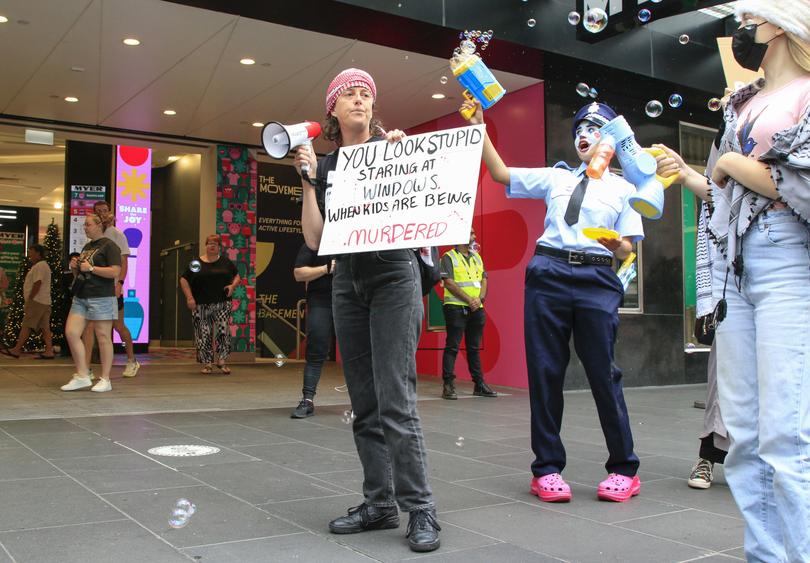KATE EMERY: Polite protest does not work. The disruption is the point
KATE EMERY: The idea that there is a perfect way to protest that a) doesn’t inconvenience anyone, yet somehow b) brings attention to your cause is a porky right up there with raw milk as a health tonic.

The idea that there is a perfect way to protest that a) doesn’t inconvenience anyone, yet somehow b) brings attention to your cause is a porky right up there with raw milk as a health tonic.
The disruption is the point.
Getting angry at pro-Palestinian protesters for gatecrashing Myer’s Christmas window display reveal to draw attention to the carnage in Gaza or at Stop Oil protesters for throwing soup at a Vincent Van Gogh masterpiece to demand action on climate change is like getting angry at advertising jingles for being so damn catchy.
Sign up to The Nightly's newsletters.
Get the first look at the digital newspaper, curated daily stories and breaking headlines delivered to your inbox.
By continuing you agree to our Terms and Privacy Policy.They’re trying to get your attention.
Without disruption and inconvenience, a protest is the equivalent of the Jehovah’s Witnesses who spend their days handing out copies of The Watchtower in Murray Street mall: eminently avoidable.
Former prime minister Scott Morrison illustrated this point back in his day when he had a crack at Extinction Rebellion protesters who graffitied Parliament House and superglued themselves to the ground in an effort to highlight the need for more action on climate change.

Talking to reporters after the fact Mr Morrison suggested those protesters were un-Australian (as though thumbing our nose at authority isn’t supposedly part of our DNA), while highlighting the efforts of another protester, Frances. Apparently Frances spent her time standing respectfully outside Parliament with a sign that read: “Strong climate target = strong economy”.
“She’s there almost every morning and she makes this point every day and she gives me a wave and she gives me a smile,” Mr Morrison said. “I’ll tell you what, I’m listening to her.”
Maybe I missed all the previous press conferences Mr Morrison held to address Frances’ concerns or maybe it took a bunch of people with spray cans and superglue to achieve that.
Excluding the use of physical violence — thankfully rare in Australia — there isn’t a right or a wrong way to protest.
That includes disruptive direct action that can be a massive pain in the arse to commuters or shoppers or art fans who just want to enjoy Sunflowers without half a can of cream of tomato sliding down the petals.
But they’re just alienating the mainstream and doing damage to their cause!
That’s the theory, anyway. But it’s probably not the case.
The problem with trying to figure out what kind of protests are effective is that correlation doesn’t always mean causation.
Plenty of landmark social achievements — think civil rights in the US, giving women the right to vote, the end of the Vietnam war — were accompanied by disruptive protests.
But did one cause the other or would we have got there in the end anyway? Short of a Sliding Doors scenario — a film in which Gwyneth Paltrow plays out two alternate storylines, for anyone who wasn’t a rom-com fan in the 1990s — it’s impossible to say.
Millions of people marched in the US, the UK and Australia in 2003 to protest the looming invasion of Iraq to absolutely no avail. Would they have had more success with a can of Heinz and the Mona Lisa?

My only personal experience with disruptive protest was in the early 2000s when I dressed up as a turtle to “sit in” with other protesters at the bank involved in funding a planned development at Mauds Landing near WA’s Ningaloo Reef.
The development was killed by then premier Geoff Gallop for reasons perhaps unrelated to the time I spent wearing a swimming cap on my head and a washing basket on my back to annoy customers who just wanted to get their banking done on their lunch break.
Instead of anecdotal evidence we can look at scientific research, which suggests disruptive protest is probably more effective than those forms of protests that annoy nobody and are noticed by even fewer (sorry, Frances).
There’s also evidence to show that even when disruptive protests makes people dislike the protesters it doesn’t necessarily reduce support for the cause they’re banging on about (although when physical violence is involved that can change).
University of Bristol researchers ran experiments on various kinds of nonviolent protests, from abortion to climate change, and found that even when disruptive protests reduced support for the protesters it didn’t reduce support for the cause.
University of Bristol cognitive psychology chair Colin Davis put it this way: “Dramatic protest isn’t going away. Protagonists will continue to be the subject of (mostly) negative media attention, which will lead to widespread public disapproval. But when we look at public support for the protesters’ demands, there isn’t any compelling evidence for nonviolent protest being counterproductive. People may ‘shoot the messenger’, but they do — at least, sometimes — hear the message.”
Or, to put it another way: you can think protesters spray-painting Stonehenge, or ruining your kids’ Christmas shopping outing or running through Bunnings’ entire supply of superglue are wallies while believing that what’s happening in Gaza is a tragedy and that future generations deserve a habitable Earth.
